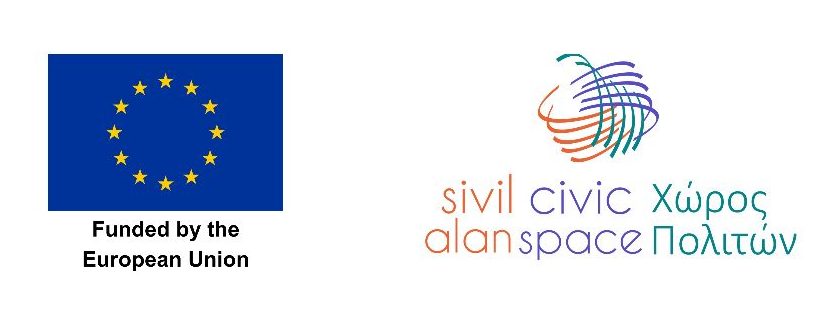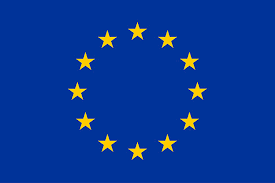Frequently Asked Questions
Grow Civic Support Programme is an in-kind support programme implemented under the Civic Space Project that is funded by the European Union. It aims to support activists and civil society organisations in building organisational capacities, enhancing democracy and human rights, promoting and supporting peace and reconciliation, facilitating mono and multi-communal partnerships in Cyprus as well as with CSOs in other EU Member States, European Economic Area (EEA) and IPA countries. It is not a grant programme that contains a transfer of funds, rather it is an in-kind support programme. As such, the costs of services or supplies required by the approved actions are directly compensated by the Civic Space Project to the service providers/suppliers.
It is not a grant programme that contains a transfer of funds, rather it is an in-kind support programme. As such, the costs of services or supplies required by the approved actions are directly compensated by the Civic Space Project to the service providers/suppliers.
Grow Civic supports activists legally residing in Cyprus, registered or unregistered civil society organisations, citizen’s initiatives, groups, platforms, initiatives in Cyprus that work for public benefit.
There are 7 different support packages that are designed to address the diverse needs of activists and CSOs. Activists can request support from ONLY one of these packages that is named as Activist. CSOs on the other hand, depending on their location, their experience and their action can request support from one (or more) of the 5 different support packages.
The eligible request owners for each support package are detailed below:
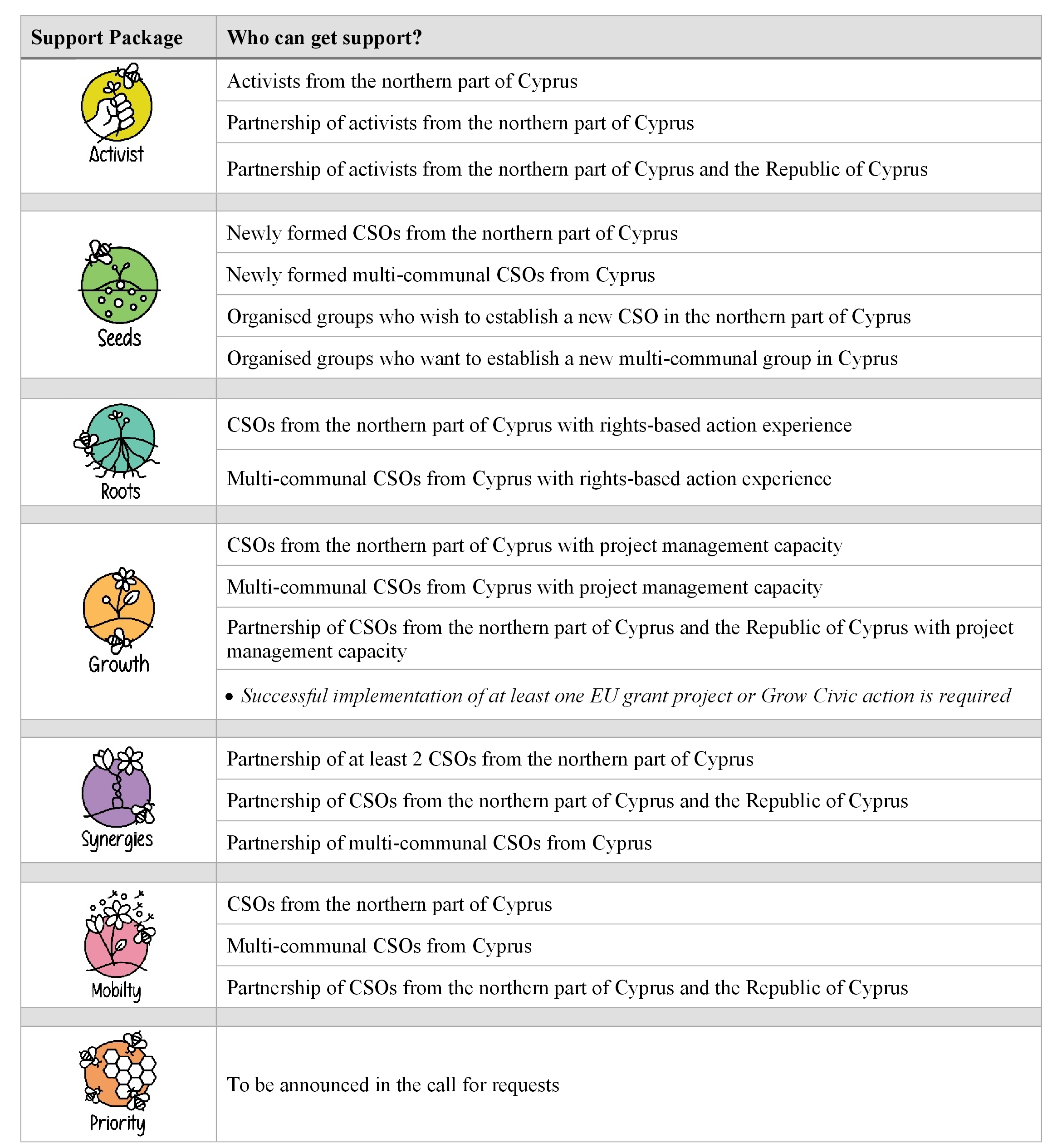
Important note: If the CSO request owner fulfils the eligibility criteria mentioned on the above table, they may add additional activist(s), multi-communal CSOs, CSOs from the northern part of Cyprus, from the Republic of Cyprus, from other EU MS, EEA or IPA countries.
Other than mobility actions, it is expected that most of the activities are implemented in Cyprus.
Other countries that are allowed to have activities in are as follows:
Albania, Austria, Belgium, Bosnia and Herzegovina, Bulgaria, Croatia, Czech Republic, Denmark, Estonia, Finland, France, Greece, Hungary, Iceland, Ireland, Italy, Kosovo, Latvia, Lichtenstein, Lithuania, Luxembourg, Malta, Montenegro, Netherlands, North Macedonia, Norway, Poland, Portugal, Romania, Serbia, Slovakia, Slovenia, Sweden, Turkey.
An eligible request owner may have partners (activist or CSO) from these countries if necessary, however, their partnership does not increase the available maximum budget allocation.
If the legal residence of the person is in Cyprus and spends most of their time in Cyprus with a legal permit, then this person is accepted as legally residing. This status is not related with citizenship. While citizens of other countries who reside in Cyprus are eligible for support, Cypriot citizens who are not residing in Cyprus for most of the year are not eligible to request support from Grow Civic.
However, legal residence is not mandatory for activist partners of eligible request owners: as long as they are from other EU MS, EEA or IPA countries.
Having a not-for-profit characteristic does not automatically make a CSO public benefit. Public benefit CSOs are those that are founded with the principal mission of engaging and working for the public benefit. They may be working on different thematic fields, such as environment, education, human rights, gender equality, poverty reduction, health, etc. CSOs working and operating principally to promote or protect the rights and interests of socially disadvantaged person groups are also accepted as public good CSOs.
Some other type(s) of CSOs are founded with the principal mission of protecting the interests of its members, founders, specific vocational groups, or persons/groups associated with them. Hence, the mandate of such CSOs is not primarily to promote and work for the general good of the public but rather to work for the benefit of their members. Some examples of such CSOs are labour unions, trade unions, trade and industry chambers, bar associations, doctors’ unions, etc.
Yes, they surely can. However, they are required to have partners from the northern part of Cyprus. If the request owner is an activist from the Republic of Cyprus, then they need an activist from the northern part of Cyprus as their partner. If the request owner is a registered or unregistered CSO from the Republic of Cyprus, they need a registered or unregistered partner from the northern part of Cyprus.
Activists and CSOs based in other EU MS, EEA and IPA countries cannot be request owners. However, as long as the request owner meets the eligibility criteria, they can act as partners in an action.
A multi-communal CSO for Grow Civic, is an unregistered initiative having mixed members from the northern part of Cyprus and the Republic of Cyprus.If a multi-communal CSO is formally registered, then according to where they are registered, they are accepted either as being from the northern part of Cyprus or the Republic of Cyprus.
The rights-based approach requires the consideration of institutions, groups, or individuals who have responsibility or duty in an ideal world, to provide the services, protect the rights or take the measures you intend to cover in your action. These so-called duty-bearers could be institutions and organizations such as ministries, municipalities, universities, CSOs, private sector, professional organisations, international organisations, community leaders, elected officials, etc. For each action, different duty bearers might have different roles and responsibilities. If these actors are not fulfilling their responsibilities or duties, and if you do nothing to change this in your action, this will mean that things continue to be the same and you forever would need to continue raising funds for filling in the gaps left out by them. Thereby, it can be said that the rights-based approach is not only based on the concept of a social state, but it also aims for the sustainability of actions and results.
There is further and more detailed information about the rights-based approach and how to mainstream it in your actions in the Key Concepts section/document.
To make it the easiest you can follow these steps:
- Consider that you are living in an ideal world, which institutions, groups or individuals will be fulfilling the activities/services/measures that you will be implementing in your action?
- Contemplate their roles and duties. What are they doing? What should they ideally be doing/providing?
- Contemplate on which roles and duties are performed or under-performed and which ones are not being done by the relevant duty-bearers you identified?
- Now focus on your action and the results/outcomes you want to achieve in the action you are designing. You can consider collaborating with the relevant duty bearers for the duties they are performing to make your action stronger. For duties you identified as under-performed, you might consider building the capacities of the relevant duty-bearers to ensure proper performance. And for those that are not handled at all, you might consider either advocating towards the relevant duty-bearers and remind them of their roles and responsibilities and/or collaborate with them in building their capacities to take responsibility.
- Once you decide on the approach above, now you can start thinking and planning about the specific activities you need to implement within your strategy. For example, if you will be building capacity, then most probably you will need to conduct seminars, training, study visits, research, and reports. If it is advocacy, then you will most probably be using research, social media campaigns, lobbying directly with the duty-bearers, petitions, collaborating with other CSOs that work in the same field to increase the effect and impact of your advocacy campaign, etc. These are surely examples and the types of activities you will need to pick will be very much related to the duty-bearers character and approach.
- Now that you know all the details, you can add the duty bearers you identified, the duties and responsibilities you would like to see them fulfilling, your strategy to include them in your action (advocacy and awareness-raising vs. collaboration and capacity building, or vice versa.)
The Grow Civic Programme, in line with the rights-based approach, seeks for consideration and integration of cross-cutting issues; first and foremost, the following: accessibility (the rights of people with disabilities), environment protection/ecology, gender, and youth inclusion. There are relevant questions in the request form in which you are being asked for what types of strategies you will use to ensure that these aspects are included in your action either in the form of specific activities, policies, and/or specific measures.
Such measures vary from ensuring the equal participation of genders, young people, and people with disabilities in your project activities, to organising specific activities to include young women with disabilities or to providing specific measures to enable women’s participation (e.g., provision of childcare, accessible venues, vegan or vegetarian catering, non-use of plastic bottles, energy-saving bulbs, recycling). When and if there is a research component in your action, you can make sure that all genders and ages are represented in the survey. Or when and if you will be creating a website or video you can consider sign language and subtitles for people with different disabilities). In your monitoring of action results, you can consider assessing how different groups of people (disaggregated by gender, age, disability, etc.) are being affected by your intervention.
You can find detailed information and concrete examples of activities, policies, and measures you can implement, in the guidelines that we have prepared for you. They can be accessed at https://civicspace.eu/sivil-alan-kutuphanesi/.
Request owners will be informed via MIS within 30 working days after the submission of their forms with the initial notification of status: ‘eligible’, ‘ineligible’, or ‘revisions requested’. For requests that require revisions, the issuance of the final result (eligible or ineligible) will not exceed 60 working days. This can be longer for actions that request additional time for finalizing their revisions.
The minimum and maximum action durations differ between support packages. They are listed below: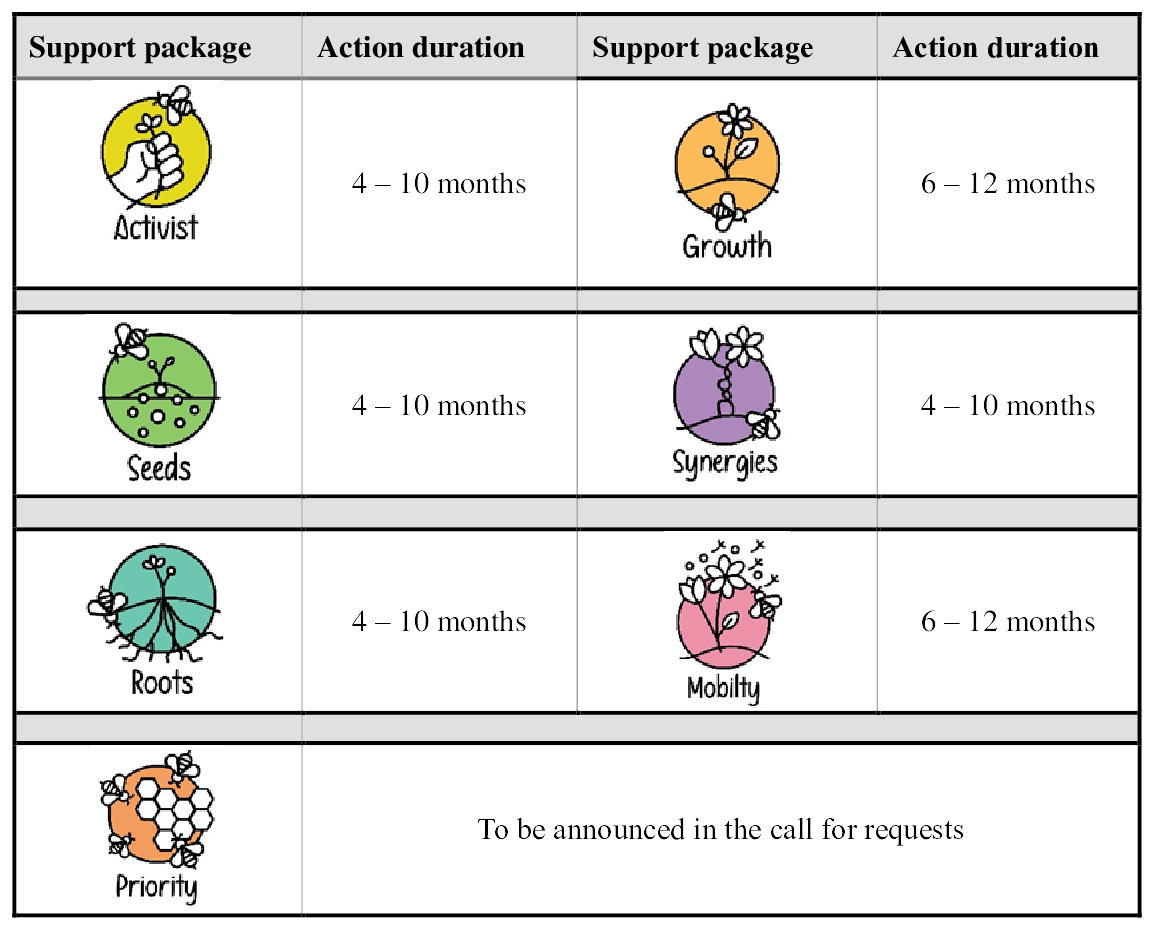
All activities supported by Grow Civic should be finalised latest by 1 September 2025.
The maximum support amounts differ between support packages. So, depending on the type of request owner and the characteristic of the planned action, the relevant package should be identified and the maximum amount for that package should not be exceeded. The maximum support amounts for each package are as follows:
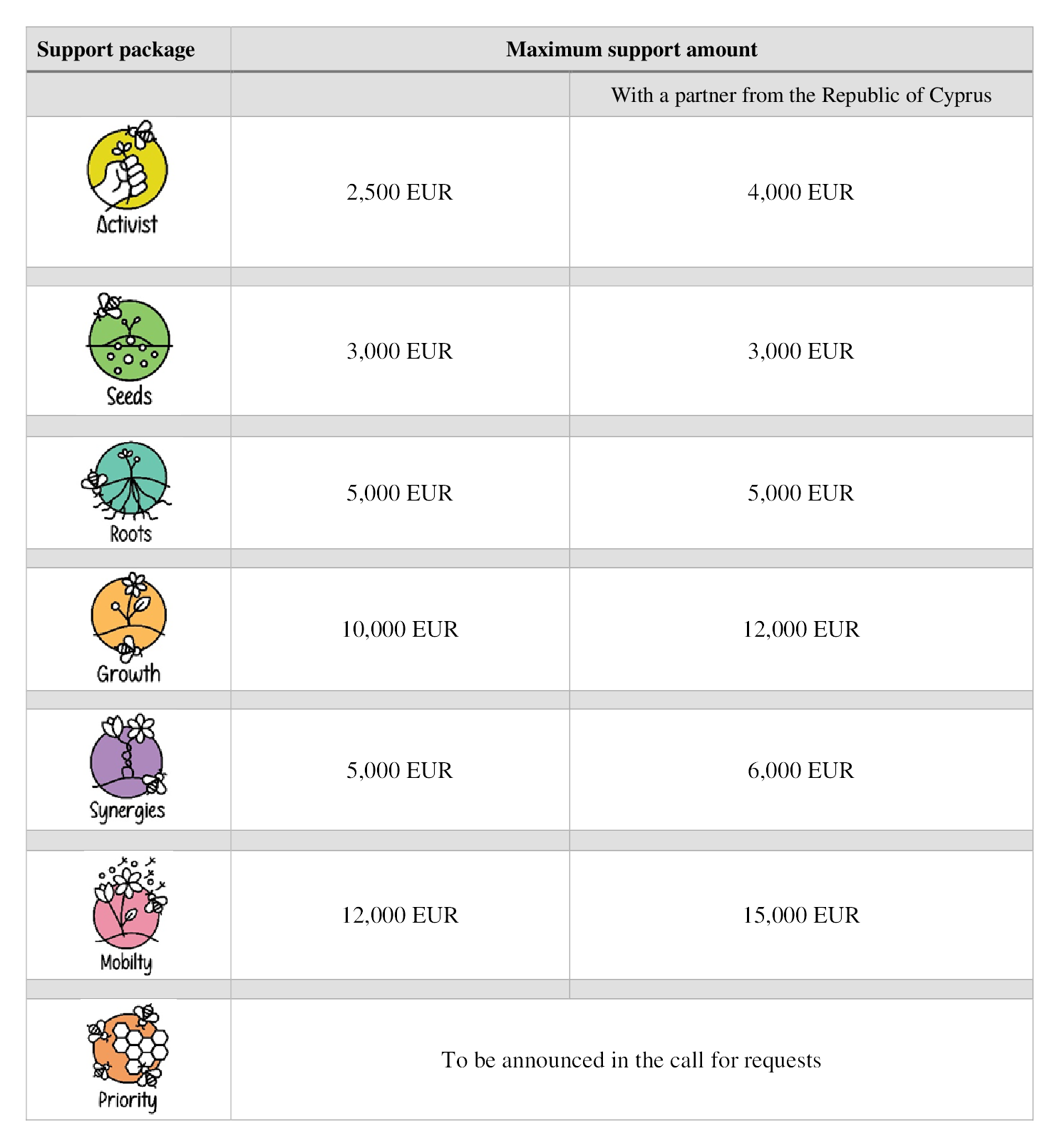
Yes, this is possible. However, there is a total maximum amount that each activist or CSO can receive for the whole duration of the Programme (till July 2025). Activists can receive support up to 8,000 EUR and CSOs up to 17,500 EUR.
An activist or a CSO cannot request support for more than one action simultaneously: for new support to be provided, the other one must be successfully finalised.
The Grow Civic Support Programme has eligible and ineligible costs. In general, costs related to travel, event participation, visual material design and production, printing, catering, venue cost, etc. are all eligible costs, as long as they are related to your activities.
The ineligible costs on the other hand consist of costs/payments related to profit-making activities, scholarships, salaries, refurbishments or renovations, equipment purchases, etc. The detailed lists of eligible and ineligible costs can be found in Request for Support Guideline.
All activists and CSOs wishing to request support from Grow Civic can ask for assistance from the Help Desk at all stages: pre-request, request and implementation stages.
You can access the help desk by phone, by e-mail, from the Grow Civic Information System (MIS), messages from Civic Space social media accounts, or by face-to-face meetings. Please do not forget to make an appointment by mail or phone if you require a face-to-face meeting.
Phone number: +90 392 227 6505
Grow Civic Information System (MIS): mis.civicspace.eu
E-mail: sivilbuyu@sivilalan.eu OR info@civicspace.eu
Civic Space office address: Hüseyin Küçük Sokak Şeytanoğlu Apt. No:3/B Köşklüçiftlik Nicosia
Questions to the Help Desk are typically answered in one working day, and within five working days at the latest.
Please note that our Help Desk will not assist you in writing or filling out the form or make any compliance check for your request form. Rather, the help desk support you will be receiving will consist of clarifications and/or explanations regarding the eligibility criteria, request process, budget issues, the MIS, questions on the request for support form, the eligibility and compliance checks, information about other Grow Civic supported actions and about potential partners or networks, etc.
We recommend you to first review the Request for Support Guideline, Implementation Guideline, Key Concepts section, materials presenting previously supported actions and other information on our website before you consult our help desk. You can find these materials on Civic Space website at https://civicspace.eu/en/sivil-buyu-destek-programi
